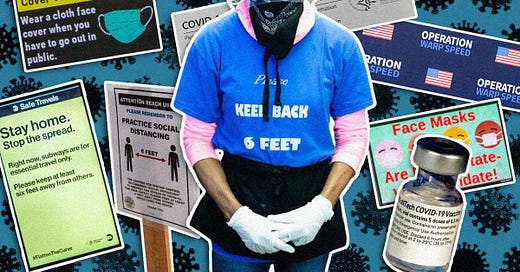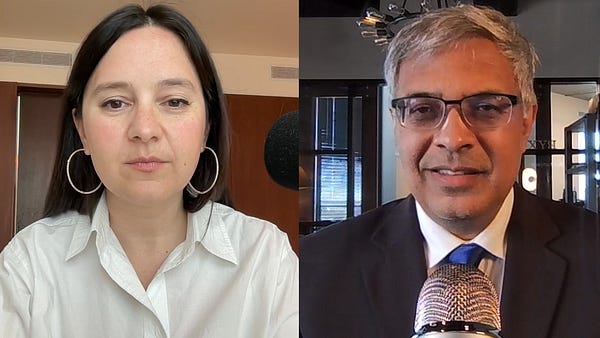
The Free Press

Last month, Britain’s National Health Service made major news when they announced that they were banning the use of puberty blockers for children, except for those enrolled in a tightly regulated clinical trial. The decision was made after an independent review found there were “significant uncertainties” surrounding the long-term effects of these drugs, which had previously been touted as totally reversible.
The announcement followed another major decision the NHS made last year on the same subject, which was to close Britain and Wales’ only treatment center for children with gender dysphoria: the Gender and Identity Development Service (GIDS) at Tavistock. The NHS found that the care provided at GIDS, which has operated for nearly 35 years, was “not safe or viable as a long-term option for the care of young people with gender related distress.”
These decisions bring the UK in sync with countries like Sweden and Norway, which have made similar policy decisions about gender care for children. But all of those countries are light-years away from how the United States approaches these issues.
My guest today, Hannah Barnes, has reported on this topic for years. Indeed, her reporting was the catalyst for many of these new changes. She’s here to explain what happened in the UK, and why the U.S. is so out of step with one of our strongest allies.
Hannah is an award-winning investigations producer at Newsnight, one of the BBC’s flagship news programs. Her important new book, Time To Think, follows the story from Tavistock’s inception to its imminent closure. It investigates how a clinic can open its doors to thousands of young patients at their most vulnerable, how it can operate for more than three decades without oversight or regulation, and how—in the words of some of the clinic’s own staff—this “medical scandal” unfolded.
Click to listen to the episode or read an edited excerpt below. See you in the comments. —BW
On investigating the Gender Identity Development Service at Tavistock:
Bari Weiss: Hannah, you’ve had a really long career at the BBC. You’re an award-winning producer for their flagship news and current affairs program, Newsnight, which is a bit like 60 Minutes in terms of prestige. For the past decade and a half, you’ve been reporting and editing some of the BBC’s most respected documentaries and shows. But for whatever reason, you decided to step into the most controversial topic in the world. Why did you decide to do that?
Hannah Barnes: Well, I didn’t realize at the time it was the most controversial topic in the world. I think I stepped into it because I thought there was something going on there, and it’s the job of a journalist to shine a light on something that’s important but that we’re not hearing much about. This is about children receiving off-label drugs and doing something potentially major to their bodies. For some children that will obviously be the right path, but when we started looking into it, we found that there were ten clinicians—a quarter of the staff—at the Gender Identity Development Service (or GIDS) that had expressed quite serious concerns at this point. Yet, the British media weren’t giving it the attention it deserved. I went into it thinking I don’t know if what they’re saying is true, but it’s really worth looking at because that’s the kind of thing we should be doing as journalists.
BW: And as you’re looking through the documents, the internal emails, these unpublished reports, what was your light bulb moment, if there was one? When did you realize that this wasn’t just a few examples of treatment gone awry but a system-wide problem?
HB: So, this is a healthcare story. No one is questioning someone’s identity or that trans people should have anything other than happy lives free of harassment. It wasn’t about identity for us ever. It’s about “Are vulnerable young people being given the best and safest care possible in each and every case?” But I think I realized that there was something quite serious here when I saw the transcripts of some of the interviews that took place as part of an official review of the clinic that was published early in 2019. The review said they had investigated, and none of the concerns that had been raised and leaked to the media were of immediate safeguarding concerns. And then you read what a sizable number of clinicians told the medical director on record, and it’s awful. Some of them had serious child protection concerns. There were clinicians saying these are some of the most vulnerable children they’d ever worked with and they are in really desperate situations. In some cases they’re being referred for a medical intervention after an hour. It’s quite clear from those documents just how worried they are, and it’s just impossible to see those concerns as coming from a place of transphobia. It’s just not credible. These are professional people who’ve dedicated their working lives to helping young people, and what they were saying boils down to: this is not good clinical practice. This isn’t how we’ve ever practiced in other places we’ve worked. Somehow, because this is a gender clinic, the same questions that we would ask normally were not welcome.
On whistleblowers, ignored research, and bad clinical practice:
BW: In your book, you report that in 2000 there was an internal audit done of about 150 patients at the Tavistock gender clinic. That audit found the vast majority of the clinic’s patients were dealing with lots of other issues on top of gender dysphoria, whether that was anxiety or depression, abuse in the home, or an eating disorder. There was this additional internal report done in 2005 by the medical director of Tavistock, and what it found was pretty alarming. It found that no one was collecting data on the patients and that there was a lot of internal confusion and conflict within the clinic about the very treatments they were providing. In short, providers at Tavistock could not agree on whether they were treating children distressed because they were trans or children who identified as trans because they were distressed? Or was it a combination of both? The medical director also said this of puberty blockers in 2005: “They are relatively untested and unresearched.” Tell me about both of these findings of the audit and the report, and what changes were made at the gender clinic following these things coming to light.
HB: The audit was meant to be the start of a more rigorous, scientific approach to helping this group of vulnerable young people. The better you know your patients and what’s going on with them, the more you can cater their care. So David Freedman, a social sciences researcher, undertook this audit with a couple of other people, and the idea was that they would use the findings to improve, and then continue. But they didn’t do that. Even in 2005, Sue Evans, who was the first whistleblower, felt that young people were being referred too quickly for physical interventions for puberty blockers, and there really wasn’t adequate exploration in some of these cases. So, the report, which was very thorough, went unseen until 2020 when I filed a Freedom of Information Act and received it from Tavistock (they had resisted quite vigorously). And it’s really striking because the recommendations are really sensible. What Dr. David Taylor, who was the medical director, said was: if we’re going to do this, we need to do it properly. We need to conduct proper research. How are these young people using the blocker? Are they using it as time to think, or what else is going on? Who are the people that we’re seeing? And he said, look, I’m not saying we shouldn’t use blockers. But they should be a last resort. Therapy should come first. Most importantly, he said, we have to support our staff in being able to say no when a patient requests puberty blockers and intervention. And he said, if our staff doesn’t think it’s appropriate, they must be able to say no and be supported in doing that. Dr. Taylor also suggested that they do regular and retrospective audits of both those who went on the blockers and those who didn’t, because you can learn from everyone. But none of that happened. So, as for the second part of your question, how were the findings used? Well, they were ignored.
On the NHS’s decision to close Tavistock:
BW: Your reporting helped precipitate this very extensive review by the UK’s National Health Service in February 2022, which found that the type of care that was being provided at the Tavistock gender clinic wasn’t safe. Dr. Hilary Cass wrote in one part of the report that, “Primary and secondary care staff have told us that they feel under pressure to adopt an unquestioning affirmative approach and that this is at odds with the standard process of clinical assessment and diagnosis that they have been trained to undertake in all other clinical encounters.” Tell us about the details of the report and why the NHS ultimately decided that they’re going to close the clinic in 2024.
HB: In January 2021, the CQC, our healthcare inspectorate, published a report that rated the clinic and its leadership inadequate. While it acknowledged that the staff were compassionate and cared about the young people, the report said that in lots of cases there was no evidence informed consent had been obtained. They said that risk wasn’t being adequately managed, both for those on the very long waiting list for care, but also those who were already being treated at the service. They said they couldn’t understand why clinical decisions had been taken because it wasn’t well documented. There wasn’t the expertise to deal with young people with autistic traits who, according to Tavistock’s own figures at one point at least, made up 35 percent of referrals. They said that staff felt unable to speak up for fear of retribution. The report was very, very damning. When we got the interim report from Dr. Cass, it was quite sad because she made exactly the same points that these members of staff had been raising for seven years, but nothing had changed. It explained that there needed to be different pathways—that, just as there were different ways into gender dysphoria, there had to be different ways out of it as well. It said there was no agreement on what the purpose of the blocker was. All these things were—although they wouldn’t put it in these words—vindicated, really. As a consequence of that, the NHS made the decision that it has to be a fundamentally different model that was more holistic. There had to be greater emphasis on mental health, and you needed experts in really working with young people. You didn’t have to be a gender expert; you needed to understand adolescents and mental health, and maybe autism and neurodiversity and trauma. Dr. Cass called for a fundamentally different model, and the NHS is now closing GIDS, the Tavistock gender clinic. It was meant to be shut by now, but it’s going to be another year, they say. March 2024 is the latest they’ve given. In the meantime, it’s a complete mess. You’ve got 8,000-plus struggling young people on a waiting list with absolutely no care or support whatsoever.
On what Tavistock’s closure means for youth gender care around the world:
BW: When you look at your reporting from a ten-thousand-foot view, do you think what happened at Tavistock is a unique scandal, or do you think the real scandal is how normalized this kind of medicalized treatment among young people has become?
HB: So, I’m going to start with my understated Britishness by saying that I avoid using the word scandal because we don’t know yet what the scale might be because we just don’t have the data. We know that some people have been harmed and we know that some people have been helped, and we just don’t know the numbers either way. But what I think is really striking is that people who worked in the clinic, who did those assessments, who made those referrals, fear they have played a part in a huge medical scandal. So I’m just going to start with that caveat. What I would say is that, yes, we have a different healthcare system here in the UK than the U.S., but the evidence base is the same wherever young people live in the world, and the evidence base is weak. No one has been able to replicate the findings of the Dutch team that pioneered this approach. Now, those studies have come under much more scrutiny, and those findings themselves are not strong. And yet that is the basis, really, for gender-affirming medical care in young people in its entirety. So, is what happened at the Tavistock clinic happening elsewhere? Absolutely.
BW: I think one of the things that’s made people stand back and really given them pause is that countries across Western Europe that had been at the cutting edge of this kind of treatment—Finland, Sweden, Denmark—are now publicly reversing course. Finland now says that psychotherapy rather than puberty blockers and cross-sex hormones should be the first line of treatment for gender-dysphoric youth, and that gender reassignment for minors is an experimental practice. In France, the National Academy of Medicine called for “great medical caution” regarding treatment of young people for gender-related distress. I think the evidence is almost like a snowball. It started slowly; now it’s gathering speed, and it’s really giving people a sense of like, wow, something major went wrong here. You’re a reporter—what is your hypothesis for what went wrong?
HB: This area of healthcare has avoided any of the normal scrutiny one would expect, particularly when dealing with children and with a drug that’s being used off-label. The questions and scrutiny that would normally apply from healthcare commissioners, from politicians, from society, and from the media, they just weren’t asked. And I think that’s what’s gone wrong. Collectively, there has been this fear that if you questioned the standard of care here, that you’re somehow questioning the patient population. We wouldn’t have some great cancer hospital applying treatments which haven’t gone through clinical trials and don’t appear to have any evidence of them working. That’s not attacking people with cancer. That’s attacking the system. It’s really strange that any scrutiny is seen as hateful when actually the reverse is true. Because if gender clinics and society and medicine can get this right, then care will be better both for patients who will thrive as trans adults, and for those for whom it won’t be the right pathway. It’s going to be better for everybody.
BW: Here in the U.S., this feels like a very partisan issue. I don’t think it actually is, but I think it feels that way to a lot of people. Hannah, why is this topic and conversation so important?
HB: It’s important because they’re children. It’s the rest of their lives, and adults need to protect children. Absolutely trans people face real transphobia and bigotry. But actually, the current system isn’t serving trans people very well. The adults need to come back into the room. It’s the job of adults to say no, and that’s not saying no to every one of these young people, because it’s more complicated than that. There is a lot of nuance and there’s this real desire for certainty, like “ban puberty blockers or everyone has them.” But the welfare of children is everybody’s responsibility. The judge of a civilized society is how we protect the most vulnerable.
To support conversations that matter, become a Free Press subscriber today:















I am a retired physician and had a conversation with a young medical student, who told me that Trans People needed doctors to help them transition into the type of body they would feel most comfortable to inhabit. So her view of them was as though they were a real class of such people who would be improved by transitioning them into a body less feminine or masculine in appearance.
Having met a few of these patients, I found that they were mentally unwell and that they preferred to believe that they had a "physical" ailment rather than a mental one. My medical student had never met a young teenage girl who weighed less than 90 lbs., who believed she was "fat". My idol as a young man was the famous Karen Carpenter, who died of anorexia nervosa. Can you imagine if the AMA recommended to these girls that they should all be affirmed in their belief that they were fat?
Our medical bureaucracies were corrupted by an ideology that permitted the atrocities committed by physicians excited about the prospect of "treating" these newfound patients with medications and/or surgery once they felt that they had a green light given to them by the APA and the AAP. It deeply frightened me that an obviously bright young medical student could believe this nonsense that thousands of patients would suddenly come to the conclusion that they were in the wrong type of body. It was apparent to me, that it was no longer cool to be a Gay or Lesbian person; you had to be Trans. That is much better, because it means that your sexual attraction for your own biological sex can be blamed not upon your mind, but on your incorrect body type instead. In this way, you remain heterosexual and quasi-normal, and are just a victim of some kind of error in your embryonic development. This could almost be believable, except the ideologues took it too far and started to say that one's sexual identity was controlled by one's mind and had nothing to do with a person's body.
The Trans activist movement was doomed by the post-modernist ideology and the increasing number of such people taking advantage of access to private female spaces, access to their sports teams, and the growing number of young women with regrets about damage done to their bodies as they ceased having the delusion that they were men and wanted to again become realigned with a self image and identity congruent with every nucleated cell in their body.
Stunning that it has taken so long for this information to suface and that so much effort had to be expended. I would that is the next avenue of investigation: why did so many latch onto a single un-reproduced study so tenaciously for so long? Its hard to avoid the suspicions of an agenda driven person or groups whether for politics or profit.